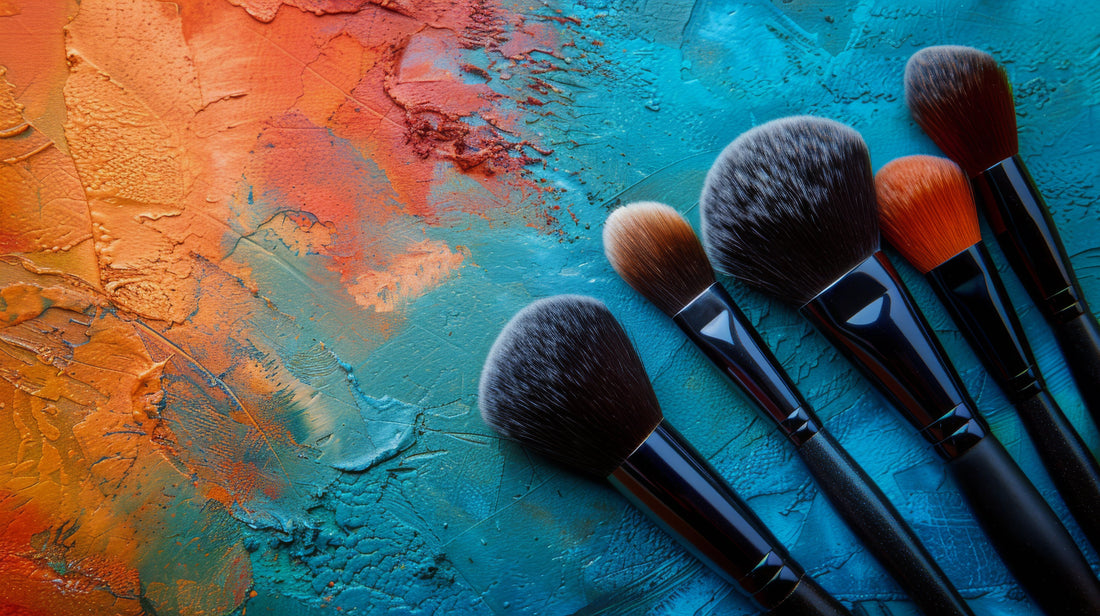
Keep Your Cosmetic Brushes Clean
Share
Keeping Your Cosmetic Brushes Clean: Importance, Techniques, and Best Practices
Cosmetic brushes are a fundamental part of every makeup lover’s toolkit. Whether you’re a beauty professional or someone who simply enjoys daily makeup, your brushes are the tools that help you create flawless looks. However, one crucial aspect often goes overlooked – cleaning your brushes. Keeping your makeup brushes clean is essential for both your skin’s health and the quality of your makeup application.
In this blog, we’ll dive deep into the importance of keeping your cosmetic brushes clean, the risks of not cleaning them regularly, and the best techniques to clean each type of brush.
Why Is It Important to Keep Your Cosmetic Brushes Clean?
1. Prevents Bacteria and Germ Build-Up
Dirty brushes are a breeding ground for bacteria, dust, oils, and dead skin cells. These contaminants can accumulate on your brushes over time, especially when used on the skin, leading to potential skin issues like acne, clogged pores, and other irritations. Clean brushes help maintain the hygiene of your skin and prevent bacterial growth.
-
Bacteria on makeup brushes, dirty makeup brushes causing acne, and makeup brushes causing skin irritation are common search terms to integrate throughout the blog.
2. Ensures Flawless Makeup Application
When brushes are clean, they work efficiently. Brushes full of old makeup and dirt can affect the application of your foundation, concealer, eyeshadow, or blush. They may cause streaks, uneven blending, or product buildup, making your makeup appear patchy. Clean brushes deliver the desired smooth, flawless finish that we all aim for.
3. Prolongs the Life of Your Brushes
Cosmetic brushes are an investment, and they’re not cheap! Cleaning them regularly extends their life and keeps them in excellent condition. Product buildup on the bristles can cause them to become stiff and unresponsive. Regular cleaning keeps the bristles soft, pliable, and effective for longer, saving you money in the long run.
4. Prevents Cross-Contamination
If you share makeup brushes or use them on different clients, there’s a risk of cross-contamination. Brushes used on one person may carry bacteria, oil, or fungi, and when used on another person, it can transfer harmful substances. Thorough cleaning eliminates this risk and ensures that your brushes are safe to use on multiple people.
How Often Should You Clean Your Makeup Brushes?
Daily Brush Cleaning
For brushes that come into contact with liquid products or sensitive areas of the face (like foundation and concealer brushes), daily cleaning is essential. For others, weekly or monthly cleaning is sufficient. Let's break down the cleaning frequency for different types of brushes:
-
Foundation Brushes (liquid and cream)
-
Concealer Brushes
-
Eyeshadow Brushes (especially when switching between colors)
Daily cleaning can be done using a quick brush cleaner spray.
-
SEO Tip: Using terms like “how often should you clean makeup brushes” and “daily brush cleaning tips” will help your blog rank higher.
Weekly Brush Cleaning
-
Powder Brushes (used for powder foundation, bronzer, or blush)
-
Blush Brushes
-
Bronzer Brushes
These brushes collect less product than liquid-based ones, but they still need a good weekly clean to prevent any buildup of powders or oils.
Monthly Brush Cleaning
For specialty brushes or brushes that don’t come into frequent contact with your skin, monthly cleaning will suffice. These include:
-
Lip Brushes
-
Eyeliner Brushes
-
Specialty Brushes (contour, fan brushes)
Regular cleaning is necessary for hygiene, but these brushes don’t need to be cleaned as often as foundation or concealer brushes.
Best Practices for Cleaning Different Types of Makeup Brushes
1. Foundation Brushes (Liquid or Cream)
Why They Need Regular Cleaning: Foundation brushes absorb a lot of product, and if left uncleaned, they can become stiff and accumulate bacteria.
How to Clean Them:
-
Run the bristles under warm water, avoiding the ferrule (the metal part).
-
Add a small amount of mild shampoo or brush cleanser to your palm.
-
Gently lather and rub the bristles to break down any product.
-
Rinse thoroughly until the water runs clear.
-
Squeeze out excess water, reshape the bristles, and lay flat to dry.
Pro Tip: For an extra deep clean, consider using baby shampoo or a gentle cleansing oil.
2. Powder Brushes (Blush, Bronzer, Setting Brushes)
Why They Need Regular Cleaning: Powder brushes can accumulate product over time, leading to ineffective application or mixing of different powder products.
How to Clean Them:
-
Tap the brush to shake off any excess powder.
-
Gently lather the brush with mild liquid soap or brush cleanser.
-
Rinse under warm water until the water runs clear.
-
Squeeze out the excess moisture, reshape the brush, and leave it to dry.
Pro Tip: Allow these brushes to air dry by placing them flat or at an angle. Avoid drying them upright as this can cause water to seep into the ferrule.
3. Eyeshadow Brushes
Why They Need Regular Cleaning: Eyeshadow brushes pick up different pigments, and it’s important to clean them frequently to prevent color contamination, particularly when working with vibrant or pigmented shades.
How to Clean Them:
-
Rinse the brush under lukewarm water.
-
Add a drop of brush cleaner or mild soap to your palm.
-
Swirl the brush in the soap and gently rub to break down pigment.
-
Rinse thoroughly and reshape the brush.
-
Let the brush dry on a towel.
Pro Tip: For a quick clean between uses, you can use a spray brush cleaner to eliminate color residue.
4. Eyeliner Brushes and Lip Brushes
Why They Need Regular Cleaning: These brushes are used with creamy products, such as gel eyeliner and lipstick, which tend to harden and leave residue.
How to Clean Them:
-
Dip the brush in warm water and remove excess product.
-
Apply gentle liquid soap or brush cleanser.
-
Swirl the brush to remove any leftover product.
-
Rinse thoroughly and reshape the bristles.
-
Dry the brush flat.
Pro Tip: For stubborn residue, use a bit of micellar water to break down the makeup.
Quick Cleaning Tips for Busy Days
If you’re in a rush or need to quickly clean your brushes between uses, brush spray cleaners are your best friend. These products are designed for on-the-go cleaning, and they can sanitize and clean your brushes in a matter of minutes. Just spray the cleaner directly onto the bristles, wipe it clean on a paper towel, and you're good to go.
How to Use Brush Cleaners:
-
Hold the brush by the handle.
-
Spray a small amount of cleaner onto the bristles.
-
Gently wipe the brush on a clean paper towel or cloth.
-
Allow it to dry before using again.
Tips for Prolonging the Life of Your Brushes
Maintaining your brushes goes beyond cleaning. Here are a few tips to help prolong their lifespan:
-
Store Them Properly: Always store your brushes upright in a brush holder or a cup to avoid damaging the bristles. Avoid storing them in a bag where the bristles can get misshapen.
-
Avoid Over-Washing: While regular cleaning is essential, over-washing can damage the bristles. Focus on cleaning brushes only when necessary, based on their use.
-
Use a Brush Guard: After cleaning, use a brush guard to keep the bristles in perfect shape while they dry.
Keep Your Brushes Clean for Healthy Skin and a Flawless Makeup Look
Regularly cleaning your cosmetic brushes is crucial for both your skin's health and your makeup’s effectiveness. Not only does it prevent the buildup of bacteria, oils, and makeup residue, but it also ensures smoother, more even makeup application. By implementing the tips and techniques in this blog, you’ll not only extend the life of your brushes but also protect your skin from potential irritations.
Remember, clean brushes mean a healthier complexion and flawless makeup – so make cleaning your brushes a regular part of your beauty routine!
